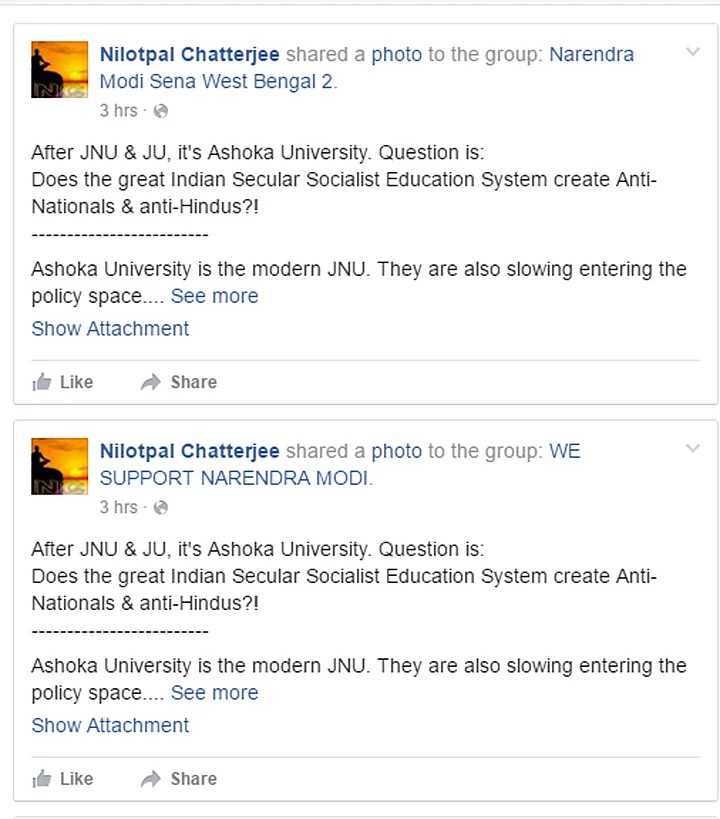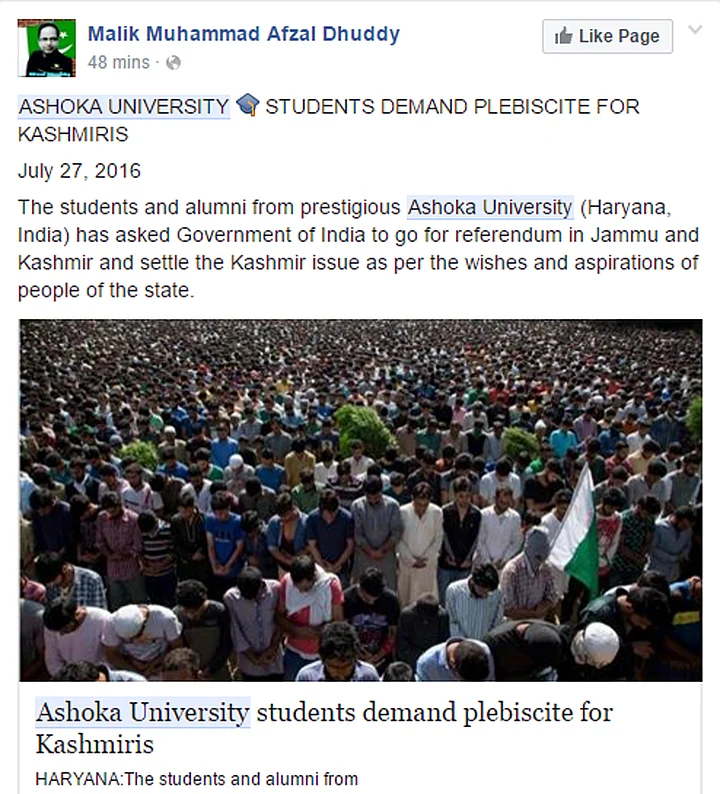I see our dirty laundry has finally been aired. As an Ashoka University alumnus, particularly the Young India Fellowship (Batch of 2014-15), I woke up this morning to find that weeks worth of back-and-forth, respectful discussion and rebuttals on all things Kashmir, Burhan Wani and free speech had now been plastered on the first page of a leading national daily, with chunks of missing or misinterpreted information about the university and, sadly, anonymous quotes from mostly only one side of the argument.
The Letter on the Violence in Kashmir
Following the death of young Burhan Wani in July, curfew and violence broke out across J&K, with horrid stories of stone-pelting and pellet guns coming to the fore. A group of six students on 20 July wrote a letter inviting members of the University to sign a petition:
A few of us, from the batch of YIF 2016, are extremely saddened with the violent unfolding of events in Kashmir post the extra-judicial execution of HM Commander Burhan Wani on the 9th of July. We believe, as ‘change agents’, which the Young India Fellows are expected to be, we need to respond to the grave historical injustice and the human right abuses the Kashmiris are met with. We strongly feel the need to condemn the violence the Indian State perpetrates as we are Young ‘India’ Fellows.Excerpt from the email introducing the petition
The letter objects to the “military occupation of Kashmir by the Indian State”, neatly elucidating the number of civilian casualties following Wani’s death. The letter ends by demanding demilitarisation of Kashmir and a plebiscite, after insisting that “the Indian state [was] inflicting all these atrocities on the Kashmiris in the name of Indians.” Though many objected to the use of legally contentious and complex terms such as “military occupation” and “extra-judicial execution”, they were quietened with a cheeky ‘if you don’t agree, don’t sign it’ slap on the wrist.
On this petition, which was eventually signed by 88 members of the University, the official name of Ashoka University was used. A polite mail from the Vice-Chancellor soon forbid the students from using the name of the university in an official capacity if only the views of some students are to be expressed.
At no point has the University stopped its students from expressing its views in solidarity of a cause they think needs their voice, it simply asked for its official name not to be used on a petition that did not uniformly represent the views of all faculty, management, administration, students and alumni.
All major universities across the world have a “Use of Name” protocol for one simple reason: the very credibility that these students sought by adding the name of the University to the letter has been built with contributions of many batches of faculty, students and staff. All members of a University benefit when the name is well used, just as all suffer when it is not.
Moreover, does Ashoka University NEED to have a political stance on the issue? Why does Ashoka not have the right to hesitate to make strong political statements, especially those for which a fair case can be made on both sides? A two-year-old University, with inarguably huge political and corporate support, has to deal with the very real and potential administrative, financial and political ramifications of such a letter; their main mandate is to keep a newly-formed University afloat, while protecting the right of its members to have their own political opinions. Signing this letter as an institution would be going against precisely that.
And what of those who believe the other side of the debate? That Burhan Wani was a militant who was struck down in a proud, quick operation by the Indian Army ordered by the Chief Minister of the state for crimes against the state? Would a student with that view be comfortable saying his or her University, backed by the biggest politicians, lawyers, businessmen and educators, endorses a monochromatic, highly questionable view?
Unfortunate Consequences
A lot happened soon after. Despite being expressly asked to not use the University’s name, the original six authors of the letter sent it forward to be first published in Kafila, with a title to suggest the university’s official backing.
Though we do not know what the consequences of this were, the administration released a series of protocols for interaction between student and alumni groups via email. While the official stance of the University remains that it was done to streamline the large volume of emails, the timing seemed far too suspect. Coming so soon after the letter, it looked like an attempt by the University to clamp down on discussions after the publication of the Kashmir letter.
This left me quite miffed. However, I will at most find fault with the ghastly PR management of the entire issue and not the University itself for being “under the regime of a right-winged government trying to do liberal studies.”
In early October, two members of the administration, Saurav Goswami and Adil Shah, sent letters of resignation, the two being the only members of the administration to have signed the letters. According to The Indian Express, students unwilling to be named believe that the two were fired by the University for speaking up for a cause.
While the “firing” is unfortunate, I have spent many an hour with Adil, basking in the winter sun between classes at university. And I hate to break the news, but while in employment, terms of a contract exist between the employer and employee. If I were to express my personal, very controversial opinion through the official platform of The Quint, I would get fired too. Not because The Quint does not believe in positive leadership for good causes, but because it was not in my capacity to utilise The Quint’s credibility.
Nevertheless, more emails followed with heftier terms such as “gross miscarriage of justice and extremely hypocritical of a liberal arts university”.
It’s largely without justification to say that a liberal arts university is violating fundamental rights under pressure from a “Hindutva government”. Could there have been political ramifications of the published letter on the University? Yes. In that case, was Ashoka University wrong or “hypocritical” to bow down to the realities of running a high-profile academic institution? No.
And, more importantly, did the University tell anyone to not express or discuss, personally or publicly, their opinion on any issue? No.
Just that it may not be everyone’s opinion and in an official capacity, it would be foolhardy and crassly self-righteous to assume it is.



